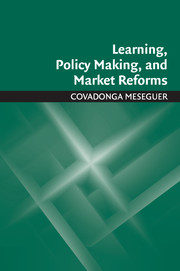6 - Learning and IMF Agreements
Published online by Cambridge University Press: 18 January 2010
Summary
The degree of confidence that governments have in IMF conditionality depends in part on the effects that it has had in the past.
Bird (1996b: 495)In this final empirical chapter, I explore whether governments entered into agreements with the International Monetary Fund as a result of learning from the performance of these agreements.
The standard view of IMF activities is as follows. Countries confronting balance-of-payment (BoP) problems can weather them by resorting to IMF loans. Because the existence of a lender of last resort may create moral hazard problems, the IMF exchanges loans for conditions. Conditionality entails several austerity measures aimed at removing basic macroeconomic imbalances (stabilization) and creating the conditions for sustainable growth (adjustment). Typically, these measures involve fiscal austerity (cutting government spending and increasing taxes), a tight monetary policy (raising interest rates and reducing credit creation), and currency devaluation (Taylor 1993: 41–42; Bird 1996a; Bordo and James 2000; Dreher 2002; Lee 2002; Vreeland 2003). As Guitián (1995) pointed out, there is a high degree of coincidence between IMF policy prescriptions and the package of policies envisaged in the Washington Consensus.
Because these measures are unpopular, it is assumed that governments turn to the IMF only when they need a loan – that is, only when they face an acute BoP crisis or when they run out of foreign reserves. Yet, a closer look shows that governments may turn to the IMF even if, on those criteria, they do not need loans.
- Type
- Chapter
- Information
- Learning, Policy Making, and Market Reforms , pp. 181 - 213Publisher: Cambridge University PressPrint publication year: 2009



